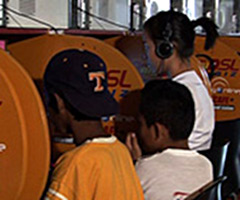Increasing the Entry-Barrier to I-Café Industry – Part 2
 Further to my blog on Increasing the Entry-Barrier to I-Café Industry and another one on Use of Genuine and Legal Software in an I-Café, I wish to expound on how I look at implementing this entry-barrier to i-café business. As it is, we already have a law covering the implementation of the intellectual property rights (IPR Law) of copyright owners and another one on anti-piracy of copyrighted materials (OMB Law).
Further to my blog on Increasing the Entry-Barrier to I-Café Industry and another one on Use of Genuine and Legal Software in an I-Café, I wish to expound on how I look at implementing this entry-barrier to i-café business. As it is, we already have a law covering the implementation of the intellectual property rights (IPR Law) of copyright owners and another one on anti-piracy of copyrighted materials (OMB Law).
I always believe that the full implementation of the IPR and OMB laws has to be done not only to protect the intellectual properties of copyright owners but also to level the playing field among the players in the i-café industry. In many forums, meetings and conferences that I have attended, i-café owners who follow the law always complain about the unfairness of allowing to operate those who use pirated software in their shops.
At present, the Optical Media Board (OMB) and the Pilipinas Anti-Piracy Team (PAPT) are the national agencies that work on the implementation of the said laws. Last year, I read in a press release that Malacañang issued Executive Order 736 creating the National Committee on Intellectual Property Rights (NCIPR), an inter-agency body headed by the Department of Trade and Industry (DTI).
But, are their efforts enough to curb software piracy and, as I said, increase the entry-barrier to the i-café industry? Sadly, I say NO, the past raids and maybe even the future ones will not be enough for the erring café owners and other business establishments to toe the line. Many offenders are still scot-free and laughing their ways to the bank.
What can be done to achieve our anti-piracy goal and increase the entry-barrier to the i-café industry? There should be many ways, but one way I could suggest is for the local government units (LGUs) to enact ordinances that will implement the provisions of the IPR and OMB laws. Make a strong provision in the ordinance and implement the rule that use of genuine and legal software be a requirement in the issuance of business permits to i-cafés.




This matter will open a lot of issues that effectively repeats the comments by many shop owners when several shops were raided by fake and genuine law enforcers years ago. And that is, “why pick on small internet cafes that are micro or small businesses?,” “we provide affordable technology to the masses, why pick on us when many small/medium/big businesses and even government agencies are big violators in the use of legitimate software.”
Pushing municipal authorities to pass ordinances that enforce strict laws using commercial software that targets Internet cafes may not be beneficial to the public who for lack of funds patronize these internet cafes. Some may even view that this action of lobbying municipal authorities is selfish so that one can eliminate his competitors and reduce the choices of the public and force them to pay more.
If one truly believes in the piracy issue, they should start with government agencies, big and medium size business enterprises. Internet cafe owners are just tiny fish in an ocean of businesses using pirated software.
There is already a national law dealing with anti-piracy issues and copyright law. And the government is actively campaigning against piracy. Why enact local ordinances that deal with the same matter again? This idea of raising the entry-barrier for the Internet Cafe business should be done in the spirit of improving or modernizing the business to better serve the customers. There is something wrong if the objective is to use local ordinances to restrict competition so that only the well moneyed can operate in that business.
If one truly wants the implementation of the IPR law, Internet Cafes should not be the sole target. Before issuance of business permits, require every business to declare their number of PCs and show proof of their original software license. Think about it for a moment. Absurd, isn’t it? It is not only Internet Cafes that use 10 to 20 PCs for their business and profiting from it. It only happens that internet cafes are the most visible and many businessmen wanted to put up one.
The law should be fairly implemented to all. In my opinion, targeting only Internet Cafes to require original software licenses is just another form of discrimination so that the well-moneyed and established internet cafes can dominate the market. What happens then when a bigger fish comes along and then pushes to enact more restrictive ordinances to push you out?